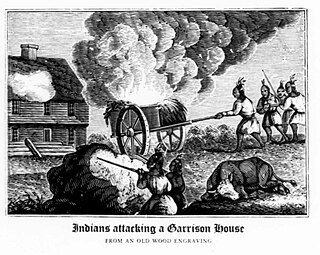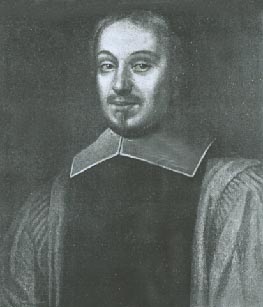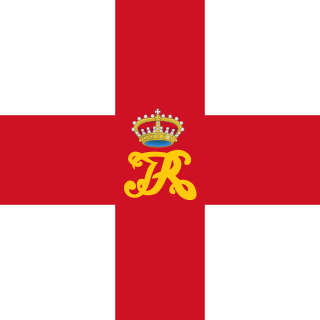Related Research Articles

The United Colonies of New England, commonly known as the New England Confederation, was a confederal alliance of the New England colonies of Massachusetts Bay, Plymouth, Saybrook (Connecticut), and New Haven formed in May 1643. Its primary purpose was to unite the Puritan colonies in support of the church, and for defense against the Native Americans and the Dutch colony of New Netherland. It was the first milestone on the long road to colonial unity and was established as a direct result of a war that started between the Mohegan and Narragansett Indian tribes. Its charter provided for the return of fugitive criminals and indentured servants, and served as a forum for resolving inter-colonial disputes. In practice, none of the goals were accomplished.

King Philip's War was an armed conflict in 1675–1676 between indigenous inhabitants of New England and New England colonists and their indigenous allies. The war is named for Metacom, the Wampanoag chief who adopted the name Philip because of the friendly relations between his father Massasoit and the Mayflower Pilgrims. The war continued in the most northern reaches of New England until the signing of the Treaty of Casco Bay on April 12, 1678.

The Province of Massachusetts Bay was a colony in New England which became one of the thirteen original states of the United States. It was chartered on October 7, 1691, by William III and Mary II, the joint monarchs of the kingdoms of England, Scotland, and Ireland, and was based in the merging of several earlier British colonies in New England. The charter took effect on May 14, 1692, and included the Massachusetts Bay Colony, the Plymouth Colony, the Province of Maine, Martha's Vineyard, Nantucket, Nova Scotia, and New Brunswick; the Commonwealth of Massachusetts is the direct successor. Maine has been a separate state since 1820, and Nova Scotia and New Brunswick are now Canadian provinces, having been part of the colony only until 1697.
John Haynes, also sometimes spelled Haines, was a colonial magistrate and one of the founders of the Connecticut Colony. He served one term as governor of the Massachusetts Bay Colony and was the first governor of Connecticut, ultimately serving eight separate terms. Although Colonial Connecticut prohibited Governors from serving consecutive terms at the time, "John Haynes was so popular with the colonists that he served alternately as governor and often as deputy governor from 1639 to his death in 1653."

Richard Bellingham was a colonial magistrate, lawyer, and several-time governor of the Massachusetts Bay Colony, and the last surviving signatory of the colonial charter at his death. A wealthy lawyer in Lincolnshire prior to his departure for the New World in 1634, he was a liberal political opponent of the moderate John Winthrop, arguing for expansive views on suffrage and lawmaking, but also religiously somewhat conservative, opposing the efforts of Quakers and Baptists to settle in the colony. He was one of the architects of the Massachusetts Body of Liberties, a document embodying many sentiments also found in the United States Bill of Rights.

John Leverett was an English colonial magistrate, merchant, soldier and the penultimate governor of the Massachusetts Bay Colony. Born in England, he migrated to Massachusetts as a teenager. He was a leading merchant in the colony, and served in its military. In the 1640s he went back to England to fight in the English Civil War.

Joseph Dudley was a colonial administrator, a native of Roxbury in Massachusetts Bay Colony, and the son of one of its founders. He had a leading role in the administration of the Dominion of New England (1686–1689) which was overthrown in the 1689 Boston revolt. He served briefly on the council of the Province of New York where he oversaw the trial which convicted Jacob Leisler, the ringleader of Leisler's Rebellion. He then spent eight years in England in the 1690s as Lieutenant-Governor of the Isle of Wight, including one year as a Member of Parliament for Newtown. In 1702, he returned to New England after being appointed governor of the Province of Massachusetts Bay and Province of New Hampshire, posts that he held until 1715.

The Dominion of New England in America (1686–1689) was an administrative union of English colonies covering all of New England and the Mid-Atlantic Colonies with the exception of the Delaware Colony and the Province of Pennsylvania. The region's political structure was one of centralized control similar to the model used by the Spanish monarchy under the Viceroyalty of New Spain. The dominion was unacceptable to most colonists because they deeply resented being stripped of their rights and having their colonial charters revoked. Governor Sir Edmund Andros tried to make legal and structural changes, but most of these were undone and the Dominion was overthrown as soon as word was received that King James II had left the throne in England. One notable change was the introduction of the Church of England into Massachusetts, whose Puritan leaders had previously refused to allow it any sort of foothold.

Roger Ludlow (1590–1664) was an English lawyer, magistrate, military officer, and colonist. He was active in the founding of the Colony of Connecticut, and helped draft laws for it and the nearby Massachusetts Bay Colony. Under his and John Mason's direction, Boston's first fortification, later known as Castle William and then Fort Independence was built on Castle Island in Boston harbor. Frequently at odds with his peers, he eventually also founded Fairfield and Norwalk before leaving New England entirely.

William Tailer was a military officer and politician in the Province of Massachusetts Bay. Born into the wealthy and influential Stoughton family, he twice married into other politically powerful families. He served as lieutenant governor of the province from 1711 until 1716, and again in the early 1730s. During each of these times he was briefly acting governor. He was a political opponent of Governor Joseph Dudley, and was a supporter of a land bank proposal intended to address the province's currency problems. During his first tenure as acting governor he authorized the erection of Boston Light, the earliest lighthouse in what is now the United States.
Thomas Hinckley was the last governor of the Plymouth Colony. Born in England, he arrived in New England as a teenager, and was a leading settler of what is now Barnstable, Massachusetts. He served in a variety of political and military offices before becoming governor of the colony in 1680, a post he held until the colony was folded into the Province of Massachusetts Bay in 1692. A monument, created in 1829 at the Lothrop Hill cemetery in Barnstable, attests to his "piety, usefulness and agency in the public transactions of his time."

Jonathan Corwin was a New England merchant, politician, and magistrate. He is best known as one of the judges involved in the Salem witch trials of 1692, although his later work also included service as an associate justice of the Massachusetts Superior Court of Judicature, the highest court of the Province of Massachusetts Bay.
John Richards was a colonial military officer, businessman, politician, and magistrate, best known for his participation in the Salem witch trials in 1692.

The Massachusetts Provincial Congress (1774–1780) was a provisional government created in the Province of Massachusetts Bay early in the American Revolution. Based on the terms of the colonial charter, it exercised de facto control over the rebellious portions of the province, and after the British withdrawal from Boston in March 1776, the entire province. When Massachusetts Bay declared its independence in 1776, the Congress continued to govern under this arrangement for several years. Increasing calls for constitutional change led to a failed proposal for a constitution produced by the Congress in 1778, and then a successful constitutional convention that produced a constitution for the state in 1780. The Provincial Congress came to an end with elections in October 1780.

The Plymouth General Court was the original colonial legislature of the Plymouth colony from 1620 to 1692. The body also sat in judgment of judicial appeals cases.

The 1689 Boston revolt was a popular uprising on April 18, 1689 against the rule of Sir Edmund Andros, the governor of the Dominion of New England. A well-organized "mob" of provincial militia and citizens formed in the town of Boston, the capital of the dominion, and arrested dominion officials. Members of the Church of England were also taken into custody if they were believed to sympathize with the administration of the dominion. Neither faction sustained casualties during the revolt. Leaders of the former Massachusetts Bay Colony then reclaimed control of the government. In other colonies, members of governments displaced by the dominion were returned to power.

Waitstill Winthrop was a colonial magistrate, military officer, and politician of New England.

Isaac Winslow was a British politician and militia officer who lived in the colonial settlement of Marshfield, Massachusetts. A member of the prominent Winslow family of the Plymouth Colony, he served as a civil and military official in a period marked by political transition.
Dudley Bradstreet was an American magistrate who served as the Justice of the Peace of Andover, Massachusetts during the Salem Witch Trials.